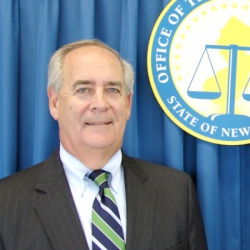Bovada announced on Thursday it would stop accepting online poker players from New Jersey. The announcement does not affect gamblers who already have signed up for online poker. The decision to leave the New Jersey market is considered to be a reaction to a recent cease and desist order sent by the New Jersey Division of Gaming Enforcement.
Bovada offers Internet poker to U.S. players through its Bovada.lv site, while gamblers in other parts of the world join the Canadian-based online card room through other portals, such as Bovada.uk. Since online gambling became legal in New Jersey, Bovada’s US portal has accepted gamblers from New Jersey. One of the reasons given for the slow signup rate at the legal Atlantic City casinos is competition from unlicensed sites like Bovada.
Politicians believe players are more likely to gamble on sites like Borgata, Tropicana, and WSOP.com if the illegal websites cannot accept customers. Since Bovada is a foreign company, it is not easy to target the company itself, but they can be targeted through Bovada affiliates. Also, because of the company’s history of trouble with the U.S. government in 2007 and 2012, Bovada might prefer to head off any new troubles.
Division of Gaming Enforcement Letter
Earlier this month, the New Jersey Division of Gaming Enforcement wrote to six United States affiliates, telling them they need to remove “any online gaming links that are not authorised under federal law or under the law of any state”. The current move by Bovada is seen as a consequence of that action by the New Jersey DGE.
Bovada’s Public Statement
The Bovada parent company released a statement saying, “Our partner brand Bovada.lv has chosen to stop new account registrations for residents of the state of New Jersey. Existing account holders will not be affected.”
The statement may not indicate it, but Bovada does not want to step into the spotlight of American gaming regulators again. The statement from Bovada went on to say, “This is a decision they have taken of their own volition and they hope that their existing customers continue to enjoy all of the products and services Bovada.lv has to offer.”
About Bovada – Former Bodog Brand
Bovada, owned by Calvin Ayre, is one of the world’s oldest, largest, and most popular online gaming brands. The website was founded in 1994 under the name Bodog. Bodog never used gaming software produced by the big British companies, such as UK-based Playtech and Microgaming, or Ireland-based Cryptologic. Instead, Bodog used some proprietary software, along with RealTime Gaming software, a company based in Costa Rica.
Bodog Poker and US Gaming Law
For these reasons, Bodog did not stop accepting American players when the Unlawful Internet Gambling Enforcement Act (UIGEA) was enacted by the U.S. Congress in 2006.
Calvin Ayre sold Bodog’s online gambling business to Morris Mohawk Gaming Group in 2006, but retained the rights to the Bodog brand. When the UIGEA was passed, the company’s intellectual property was given by the US government to 1st Technology LLC–the so-called “patent troll”–which claimed Bodog software infringed on their patents. This dispute was settled in 2009, when MMGG paid 1st Technology a sum of money. In June 2011, MMGG announced the Bodog license would expire at the end of the year, so the company was changing its name to Bovada. At the same time, Bovada would retain the same customer base as the original site.
Bodog Domain Seizure – WTO Court Rulings
In February 2012, the US Immigrations and Customs Enforcement Agency seized the Bodog domain, after indictments were handed down in Maryland for alleged illegal gaming activities, according to US law. Bodog’s parent company is based in Antigua, which means the seizure is seen as illegitimate by the WTO court.
The World Trade Organization has ruled that Antigua’s online gambling industry is allowed to offer services to US customers, because the United States allows certain forms of gambling in its confines. If the US banned its citizens from online gambling, the seizure would be seen as legitimate under international law.
Such legal actions by the American government no doubt animate the announcement by Bovada it would no longer accept real money players from New Jersey. Though the Division of Gaming Enforcement does not have the legal authority that US federal courts and other federal agencies have to cause Bovada trouble, state and federal authorities sometimes work together, when it suits their interests.

